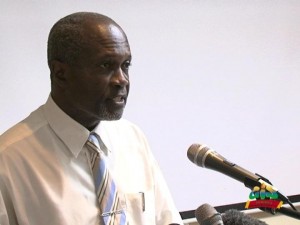
The National Accreditation Board in collaboration with the CARICOM Secretariat is currently hosting a three day training programme for external assessors.
This marks the second phase in the training of trainers’ workshop on quality assurance. According to the Chairman of the National Accreditation Board, Steve Hyacinth, one of the goals of the board is quality assurance.
“As a board, we are very interested in the whole issue of quality assurance as it relates to a programme, an institution or the whole higher education system. Consequently, the promotion of the idea of improving education quality is one of the important activities within the overall mandate of the National Accreditation Board of the Commonwealth of Dominica,” he stated.
Mr. Hyacinth spoke of the role of the National Accreditation board and the anticipated impact of the workshop.
“Our main functions are:
1. To register all institutions offering tertiary level education in Dominica and to ensure that certain minimum standards are met.
2. To provide accreditation for degree and specialised programmes.
To fulfil this mandate, the board recognise the need to train a cadre of external assessors in quality assurance. The first phase of this training took place last year, on the 29th and 30th of November. Today, we are here to conduct phase two of the training for our assessors. This will enable them to gain practical experience in the process of conducting and external evaluation for registering and accrediting post-secondary and tertiary institutions.”
Dr Ruby Alleyne of the University of Trinidad and Tobago is one of the facilitators of the workshop.
She spoke of the importance of national accreditation boards which are being developed within the region.
“Quality higher education is really very significant and very important to sustainable cultural, economic and social development. In that context, the Caribbean Single Market and Economy needs the support of quality career education systems and quality accreditation systems for that particular initiative to succeed. The development in territories across the region of national accreditation systems is, indeed, a very significant one. What we have aimed to do is to ensure that while we have been increasing access to tertiary education, expanding opportunities for our citizens that we are not drawn into a situation where we focus on quantity without focusing on quality. The intention is always to provide people with higher levels of skills and education, the kind of training that they need to be able to improve the quality of their own lives to contribute to their societies and in that way, to contribute to the development at the regional and international level as well. But if those education systems do not cater for the kinds of standards that we want, then, at the end of the day, what we do is to provide something for our citizens that will be undervalued and something that will not give them what they hope for in terms of the expectations that they would like to make for themselves and what they would like to contribute to our societies across the region,” she said.
She said that one of the items on the agenda of the workshop is addressing the challenge of cross border education.
“A number of foreign institutions see the opportunity to come into the region and to offer tertiary education in such a way that it helps to expand what we can offer and provide wider access and opportunities for our citizens. But if that is not carefully monitored and quality assured, then we can also compromise what we are providing to people of the region. So, in phase two of the workshop that we about to enter into, we will focus very heavily on the first day in particular on the issue of cross border education. In your act, the Dominica National Accreditation Board Act, you speak specifically to the fact that this board plays a role in terms of the recognition of foreign qualifications and the recognition of foreign institutions in Dominica with the intention of safe-guarding and protecting your borders from poor quality. Today, we will go into great detail in terms of what that requires of you as educators, as stakeholders, as evaluators and look at some of the resources and skills that you need to be able to make those decisions about what should be allowed in and what should be kept out of the boarders of Dominica,” she pointed out.
Melbour Phillip represented the Technical Action Services Unit of the CARICOM Secretariat.
During his address at Wednesday’s official opening ceremony Phillip explained the importance of the on-going training of regional evaluators.
“External evaluators, therefore, are integral to the success of the quality assurance system and by extension, the free movement regime of the CSME. It is, therefore, imperative that the evaluators are trained to world-class standards. This training of external evaluators in Dominica is not happening in isolation. It is part of a regional programme to build capacity within the respective national accreditation council in member states to facilitate the free movement of persons within the region,” he noted.
Meantime, Hon Minister for Education and Human Resource Development, Petter Saint Jean, has high expectations of the workshop.
“My hope is that this will be a tremendous success; one where we will see a marked difference in the whole delivery of tertiary education here in Dominica,” he stated.
The training of trainers’ workshop is being held at the Garraway Hotel in Roseau.

we do not want blaze as p.s no
Hemm…there is no smoke without fire why the CEO is not recommmeded for PS something not sonding right man
Dr. Ted Serrant should be PS.
give male teachers a break
GIVE MALE TEACHERS MORE LOVE